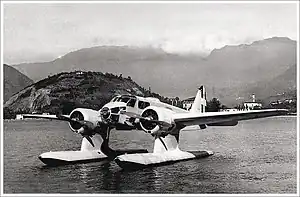Caproni Ca.316
The Caproni Ca.316 was a reconnaissance seaplane produced in Italy during World War II, intended for catapult operations from Italian Navy capital ships. It was a member of the large family of Caproni designs derived from the Ca.306 airliner prototype of 1935, and more directly a modification of the Ca.310 Idro seaplane.
| Ca.316 | |
|---|---|
 | |
| Role | Reconnaissance floatplane |
| Manufacturer | Caproni |
| First flight | 14 August 1940 |
| Number built | 14 |
| Developed from | Caproni Ca.310 |
The basic Ca.310 design was modified with the attachment of large pontoons carried underneath the engine nacelles on streamlined pylons, and a revised nose with extensive glazing on the ventral surface.
14 examples were built, but none entered service.
Specifications
General characteristics
- Crew: three
- Length: 12.89 m (42 ft 3 in)
- Wingspan: 15.87 m (52 ft 1 in)
- Height: 5.11 m (16 ft 9 in)
- Wing area: 38.0 m2 (409 sq ft)
- Empty weight: 4,000 kg (8,820 lb)
- Gross weight: 4,804 kg (10,590 lb)
- Powerplant: 2 × Piaggio P.VII radial engine , 460 kW (616 hp) each
Performance
- Maximum speed: 328 km/h (205 mph, 178 kn)
- Range: 1,600 km (1,000 mi, 870 nmi)
- Service ceiling: 6,000 m (19,680 ft)
Armament
- 1 × 7.7 mm (.303 in) Breda-SAFAT machine gun
- 400 kg (882 lb) of bombs
References
- Taylor, Michael J. H. (1989). Jane's Encyclopedia of Aviation. London: Studio Editions. p. 237.
- World Aircraft Information Files. London: Bright Star Publishing. pp. File 891 Sheet 11.
- Уголок неба
This article is issued from Wikipedia. The text is licensed under Creative Commons - Attribution - Sharealike. Additional terms may apply for the media files.